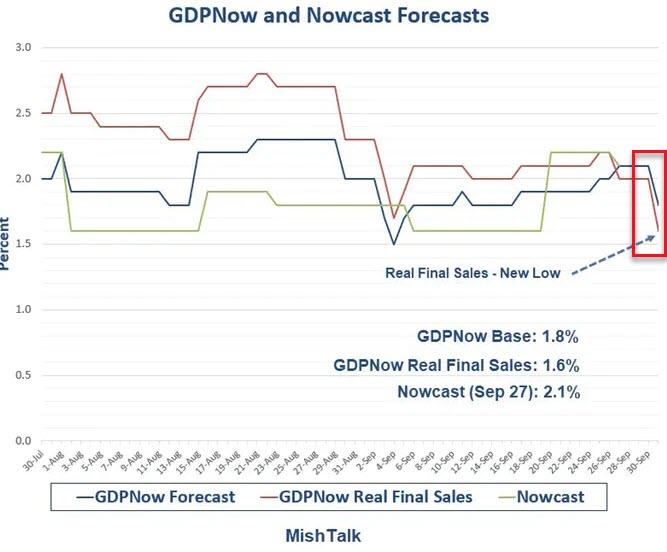Die Welt-Rezession ist da
Haben die Pessimisten doch recht behalten. Erst Deutschland, dann auch der Rest der Welt: Die Rezession ist da oder beginnt. Selbst in den USA kann man es wohl nicht mehr leugnen: “The ISM manufacturing index dived to a ten-year low of 47.8 in September and is now well into contraction territory. New export orders crashed to 41.0, the lowest level since the depth of the Great Recession in March 2009.” Kein Wunder, dass die Wachstumserwartungen deutlich zurückgehen:

Quelle: Mish Talk
Das Verschlechtern der Stimmung ist nicht zu übersehen, wie die FINANCIAL TIMES feststellt.
Quelle: FINANCIAL TIMES
In Europa schwächelt nun auch Schweden. Schweden ist wie Deutschland eine offene Volkswirtschaft und entsprechend anfällig für die Ereignisse in Europa. Kriselt Schweden, dürfte es auch um die Eurozone nicht gut bestellt sein. So die Analyse im Telegraph:
- “Sweden has suffered the most violent slump in manufacturing output since the depths of the Lehman crisis in late 2008, flashing an early warning signal for the rest of Europe’s industrial bloc. The country’s PMI reading of factory activity plummeted far below the boom bust line to 46.3 in September, (…) Sweden’s open trading economy is highly leveraged to the international cycle and is watched closely by analysts as a leading indicator for global industry. Its PMI data tends to anticipate eurozone trends by roughly two months. If you think the euro area mess is over, then think twice.” – bto: Nun, von den Lesern von bto dürfte das keiner denken. Immerhin ist klar, dass wir nicht gut aufgestellt sind für die Rezession und der Euro diesen Druck nur schwer wird verkraften können.
- “Swedish unemployment has crept up from 6.2pc to 7.4pc this year. That may cause some stress in the housing market, where apartment prices have more than doubled over the last decade and household debt has exploded to a record 190pc of disposable income.” – bto: Das kommt natürlich in Schweden noch dazu. Auch dort wurde das billige Geld dazu genutzt, um vorhandene Vermögenswerte zu immer höheren Preisen zu kaufen.
- “Switzerland’s PMI data for September also slumped, dropping to a ten-year low. A pattern is emerging where open economies that rely heavily on global trade and have big current account surpluses are getting into difficulties. (…) large perpetual trade surpluses have a corrosive side-effect. They drive down the natural rate of interest in these countries to negative levels and effectively disarm monetary policy.” – bto: Das gilt erst recht für die Eurozone!
Und was passiert an den Börsen? Die FINANCIAL TIMES zitiert die SocGen: “Quality vs Value stock valuations are entirely consistent with this bearish message, what is inconsistent is that equity markets themselves are normally down — not up, or in the very least far more volatile. The inconsistency in the global equity market is then not so much that Value stocks are so cheap or bond yields so low, but why overall equity investors appear to be both ignoring the probability that a recession will actually turn up, while at the same time remaining poorly positioned if we actually do get some economic good news.” – bto: Das leuchtet mir ein. Wenn schon Vorsicht, dann richtig.
→ ft.com (Anmeldung erforderlich): “Trading across the faultlines”, 1. Oktober 2019








